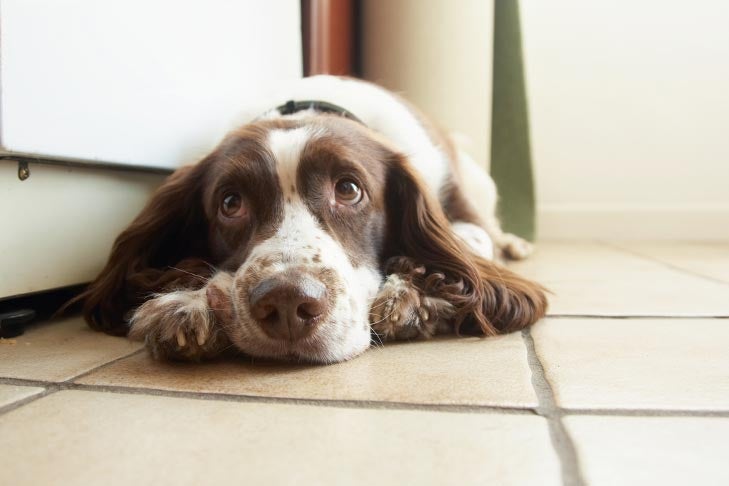
Most of us believe that our dogs experience emotions. We observe them as they display affection toward us, cower fearfully from vacuum cleaners, or alert us to the mail carrier’s arrival.
With their expressive faces and demonstrative body language, dogs can communicate a wide range of emotions to their humans. But the jury is still out on whether dogs actually understand when they do something wrong and feel guilty.
What’s That Guilty Look For?
You’ve probably come across your dog after they’ve done something naughty, like peeing in the house or shredding your favorite pair of socks. Their body language seems to radiate guilt. Many veterinary experts suggest that this is a classic case of anthropomorphism – when we attribute human characteristics or behavior to an animal.
A 2009 study examined “guilty” canine expressions. Dog cognition scientist and author Dr. Alexandra Horowitz coordinated the research, Researchers observed dogs and their owners under several sets of circumstances and discovered that dogs would display “guilty” body language more frequently when their owners scolded them than when the owners remained neutral – regardless of whether the dogs had actually done anything wrong. “A better description of the so-called guilty look is that it is a response to owner cues, rather than that it shows an appreciation of a misdeed,” Dr. Horowitz concludes.

Guilt or Fear?
When we say a dog looks guilty, we usually mean they display some or all of the following behaviors or signs:
- Tucked tail
- Visible whites of the eyes
- Cowering, hunched posture
- Yawning
- Licking
- Flattened ears
- Avoiding eye contact
These are all expressions of fear and stress in dogs. While these behaviors could also conceivably communicate a feeling, such as guilt, it poses a dilemma for researchers. Do dogs truly understand that they’ve broken our rules and feel bad about it, or are they simply reacting to our voice and body language by trying to appease us with a submissive posture?
Guilt is a complex concept. It requires an understanding of cause and effect in relation to time, which is difficult to prove. Dogs don’t talk about how they feel by using words, so we don’t know what they think about while they wait for us to come home and discover a chewed up shoe.

Learning to Appease
Dr. Mary R. Burch, certified applied animal behaviorist, suggests that when a dog looks guilty for an action such as house soiling or chewing, they’ve most likely done this before and may have experienced a strong reaction from their owner – scolding, yelling, or the cold shoulder. The dog may anticipate how the owner will react and exhibit body language, such as cowering, to try to appease their owner and ask for forgiveness.
Poking fun at a “guilty” dog in an amusing photo is one thing, but misunderstanding guilt can lead to problems. Animal behaviorists agree that because our dogs are so sensitive to our reactions, punishment after the fact can backfire.
If you come home to find your dog has done their business on the living room rug, scolding, pointing, or focusing your full attention on their mistake communicates your displeasure. Next time you go out, they may eliminate in the basement or in some other hidden space because what they’ve learned is that it upsets you to see their mess when you come through the door.
It’s far better to figure out how to prevent situations that lead to the behavior in the first place – confine your dog to a crate or pen when you’re out, hire a dog walker, be sure they’ve had plenty of exercise before you leave them.

Do Dogs Know When They Do Something Wrong?
Dogs can learn what we define as appropriate behavior if we take the time to teach them. After months of consistently telling my Lagotto Romagnolo to “leave it” as soon as she got near the lily pond in my backyard, and rewarding her when she did, I can now depend on her to spend time in my fenced yard alone and resist her instinctive urge to swim there.
So if dogs learn what their humans consider right from wrong, and they make the wrong choice, do they feel guilty? Although some experts have used her study to conclude that dogs don’t really experience guilt, Dr. Horowitz advises that we really can’t know for sure.
“My study was decidedly not about whether dogs ‘feel guilt’ or not. I would feel dreadful if people then thought the case was closed on dogs (not) feeling guilt, which is definitely not the case,” she says.
The question of whether dogs — or your dog — experience guilt remains unanswered.

